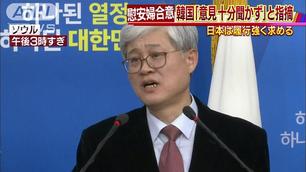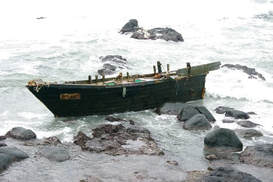 Source: www.http://news.tv-asahi.co.jp
Source: www.http://news.tv-asahi.co.jp Why, some will ask, have you put that term in inverted commas? Do you not think it is a legitimate term, invoking some of the tragic history that has impacted so greatly on Japan-South Korea relations?
Far from it. It is simply to illustrate how this subject raises raw emotions; emotions that continue to influence the issue of reconciliation and whether both countries can ever find common cause with one another.
Among certain sections of the right wing of Japan’s media and political elite, there is no such thing as “comfort women”. The term is ahistorical, and no records exist proving that the involuntary prostitution of Korean women was either 1) institutionalized, or 2) involuntary, or 3) ever condoned by the military government of Japan during the colonial occupation of the Korean peninsula.
Yet the issue is an open wound to the people of South (and one presumes North) Korea, given the level of references made to it in South Korean media and literature, and the existence of memorials within South Korea (including one located across the road from the front of the Japanese embassy in Seoul) to the girls (as many of them were) taken to serve as prostitutes to the Imperial Japanese military are a physical reminder of the degree of anger and humiliation felt by the Korean people.
The fact that both countries signed an agreement in 2015 that, ostensibly, was meant to resolve the issue of “comfort women” was never going to succeed in bringing the issue to a close. The agreement was too convenient, too cased in bureaucratic language meant to lessen any emotional reaction to it, and too distant to the events of more than 75 years ago to last any longer than a change in government.
It appears as though South Korea will believe the issue resolved if Japan, in addition to providing compensation to those “comfort women” still alive and the families of those who have passed away, produces an apology that unequivocally admits to the existence of the systematic sexual enslavement of Korean women, and uses the term “comfort women”. This would need to be supported by a public education program in Japan, of open, official acknowledgment that this system existed in Imperial Japan, and that it was perpetrated with the approval of the Japanese government and military at the time. This might then be accompanied by a public gesture, such as the establishment of a memorial to those who perished under this system, to be dedicated by a senior Japanese official – presumably meaning the prime minister.
There would also need to be a pledge, a solemn promise by the Japanese government, to honour the memory of the victims of this system, to never again perpetrate such a system, and compel all public officials to uphold this promise.
Yet these measures will never be taken by Japan. To admit that Japan utilized a system of forced prostitution would be to admit that the state acted immorally, that those who perished in war fought to perpetrate a system of institutionalized cruelty, and that successive governments have sought to obfuscate the issue rather than deal with it directly. It would mean sacrificing reputation, accepting that past policies were gravely mistaken in their intent, and that those who created such policies and carried them out were utterly wrong in purpose and execution. It would be dishonorable, humiliating even, to make such concessions, and so they will not be made.
So there will be no resolution of the issue of “comfort women” so long as it remains a very real, very painful episode that neither side will concede ground in interpreting. And so the cycle of suspicion and doubt will continue until all living memory of the “comfort women” fades into the dark recesses of history.

 RSS Feed
RSS Feed